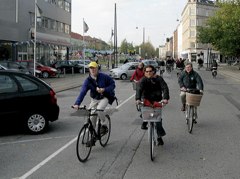
engineer Rob Burchfield on the left (in blue).
(Photo: Mikael Colville-Andersen)
A delegation of Portlanders from Metro’s Blue Ribbon Committee for Trails recently completed a week-long exploration of bike policies, culture and infrastructure in Amsterdam and Copenhagen.
Findings and recommendations from the trip will be presented at the final meeting of the Committee (which was launched back in May) on November 10th at Metro headquarters (600 NE Grand Ave.).
Below is a sneak peek at what BTA Executive Director Scott Bricker and noted local architect (and a founding member of the Cross Crusade) Rick Potestio learned on the trip.
Scott Bricker (below are excerpts from his answers to 20 questions asked by Metro about the trip).
On the history behind how Amsterdam became so bike-oriented (emphasis mine):
“In Amsterdam we learned that voters approved a measure that offered a variety of scenarios that ranged from auto free to auto “full” cities and the voters picked a scenario that highly prioritized non-motorized modes of travel. The City and nation have since truly prioritized bicycle and non-motorized travel. However outside of city centers, auto travel continues to grow.”
And Copenhagen:
“…in the 1970s citizens held a mass demonstration to protest the was automobile and consumption culture… Up to this point, bicycling had drastically dropped in the previous 15 to 20 years… Since the 1970�s bicycling has risen back to historical trends and the city continues to support and invest.”
On the pace of change here in Portland:
“Once at 15% or so (bike mode share) I think we are more at a revolutionary place…I am interested in the idea of how would a true revolution happen here.”
What are the Big Three ideas?
“…infrastructure, education/promotion (94,000 participants in Copenhagen Bike Commute Challenge!), and auto restrictions. Restrictions include pricing, car taxes, high cost of acquiring licenses, increasing driving age, etc.”
Rick Potestio (the quotes below are excerpts from an email he sent me about the trip).
On the importance of a connected system:
“The main lesson from Amsterdam is that we have to build the facilities, (lanes, trails, bikeways, bike parking etc…) or we will not have bike usage increase to become a dominant mode of travel. The system cannot be piecemeal, incidental and opportunistic or politically driven… it must be cohesive and fully connected.”
“We are on the right track, but many years behind.”
Rick also noted that the streets in Amsterdam were “very humane”.
“Within the historic core (of Amsterdam), cars and bikes share the street. Most are too narrow for lanes….sort of like our NW 13th Ave. (in the Pearl District). It is very humane.”
On the difference in our “urban form”:
“Our shortcoming is not so much our streets or will, but our urban form. We have wider streets than they do, so accommodating the modes is not an issue if we are smart about street design.”
In the end, Potestio thinks our political leadership must step up for bikes:
“What has to be politically driven is the promotion of bikes for the primary mode of transit, and the investment in facilities, and education. We have to have strong leadership and a will to spend on bikes. No more lip service or percent for programs. Bikes have to be the priority.”
Those are some strong words. Who’s ready for a revolution?
For more findings and recommendations on the Metro trip to Amsterdam and Copenhagen, come to the presentation on November 10th.
-
Blue Ribbon Committee for Trails
Final meeting and Europe trip presentation
November 10, 4-6:00pm (reception to follow meeting)
Metro Headquarters (600 NE Grand Ave.)
UPDATE:
Portland State University’s Transportation Lecture Series will feature a presentation about this trip on Friday, November 21st:
-
Portland is good, but Copenhagen and Amsterdam are AWESOME: Lessons Learned from the world’s best large cycling cities
November 21st, 12 noon
More info here

